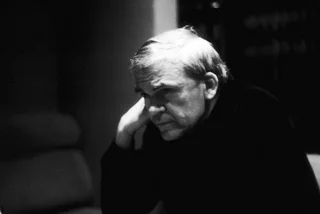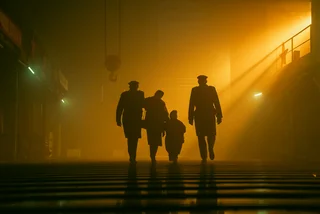Czech author Milan Kundera, now 92 years old, has lived in Paris since 1975 and has not kept close ties with his home country. Until recently, he hasn’t let his novels be translated into Czech.
He is perhaps best-known internationally for his 1984 novel “The Unbearable Lightness of Being,” and the popular film adapted from it.
It seems fitting that a new documentary about the author called “Milan Kundera: From The Joke to Insignificance” (Milan Kundera: Od Žertu k Bezvýznamnosti) will hit French screens ahead of its Oct. 21 opening in Czech screens. The film title makes reference to the names of the author's first and most recent novels.
There will be one pre-release showing of the documentary on Sept. 25 in Prague as part of the Book World Prague – Svět knihy festival.
Kundera has not given interviews in years, and he did not participate in Miloslav Šmídmajer’s new documentary. Most photographs of him are over 40 years old.
To give the film some structure, the focus is on a student who is writing a thesis. The student attempts to track Kundera down by approaching the author’s friends, who provide the bulk of the information.
The idea is somewhat like the structure of the classic Hollywood film “Citizen Kane,” where a reporter interviews people who knew a deceased, and in this case fictitious, tycoon to get a panorama of opinions on his subject.
Kundera only appears in the film in French TV reports and some recent audio clips, as well as in photographs by Václav Chochola. The film's opening and closing credits contain drawings by Kundera that had been in possession of Kundera's friends.
The author’s Czech friends appearing in the film include playwright Milan Uhde, actor Jiří Bartoška, playwright Karel Steigerwald and historian Jiří Brabec. In France, there are playwright Yasmina Reza, philosopher Bernard Henri-Levy, novelist Jean Claude Carriere, and publisher Antoine Gallimard.
As with many artists of his era, Kundera benefited from the openness of the Prague Spring in the early 1960s, but then saw his opportunities fade after the Soviet-led invasion of 1968 and subsequent Normalization, which cracked down on artistic freedom.
His first novel “The Joke” came out in 1967, and was adapted into a film in 1968. It was a satire of totalitarianism. Both the book and the film were banned after the 1968 invasion. Kundera found himself on a blacklist that prevented him from further writing.
Unable to work in Czechoslovakia, he found his way to France in the mid 1970s. His 1978 novel “The Book of Laughter and Forgetting” (Kniha smíchu a zapomnění) criticized then-Czechoslovak president Gustáv Husák.
This resulted in the Czechoslovak regime stripping him of his citizenship. He has been a French citizen since 1981. He did not get his Czech citizenship back until 2019.
PARTNER ARTICLE
Kundera’s books, even those written in France, could not be published in Czechoslovakia during the communist era. The Velvet Revolution brought little change. Since the 1990s, Kundera himself banned Czech translations, though English or French copies could sometimes be found in Czech bookstores.
A bit if breakthrough came last year, when an authorized Czech version of Kundera's 2014 novel “The Festival of Insignificance” (Slavnost bezvýznamnosti) was published.
He has won numerous prizes in his career, including the Czech State Literature Prize in 2007, the Prix mondial Cino Del Duca in 2009, and the Franz Kafka Prize in 2020. There is also an asteroid named after him, 7390 Kundera.












 Reading time: 3 minutes
Reading time: 3 minutes 
































